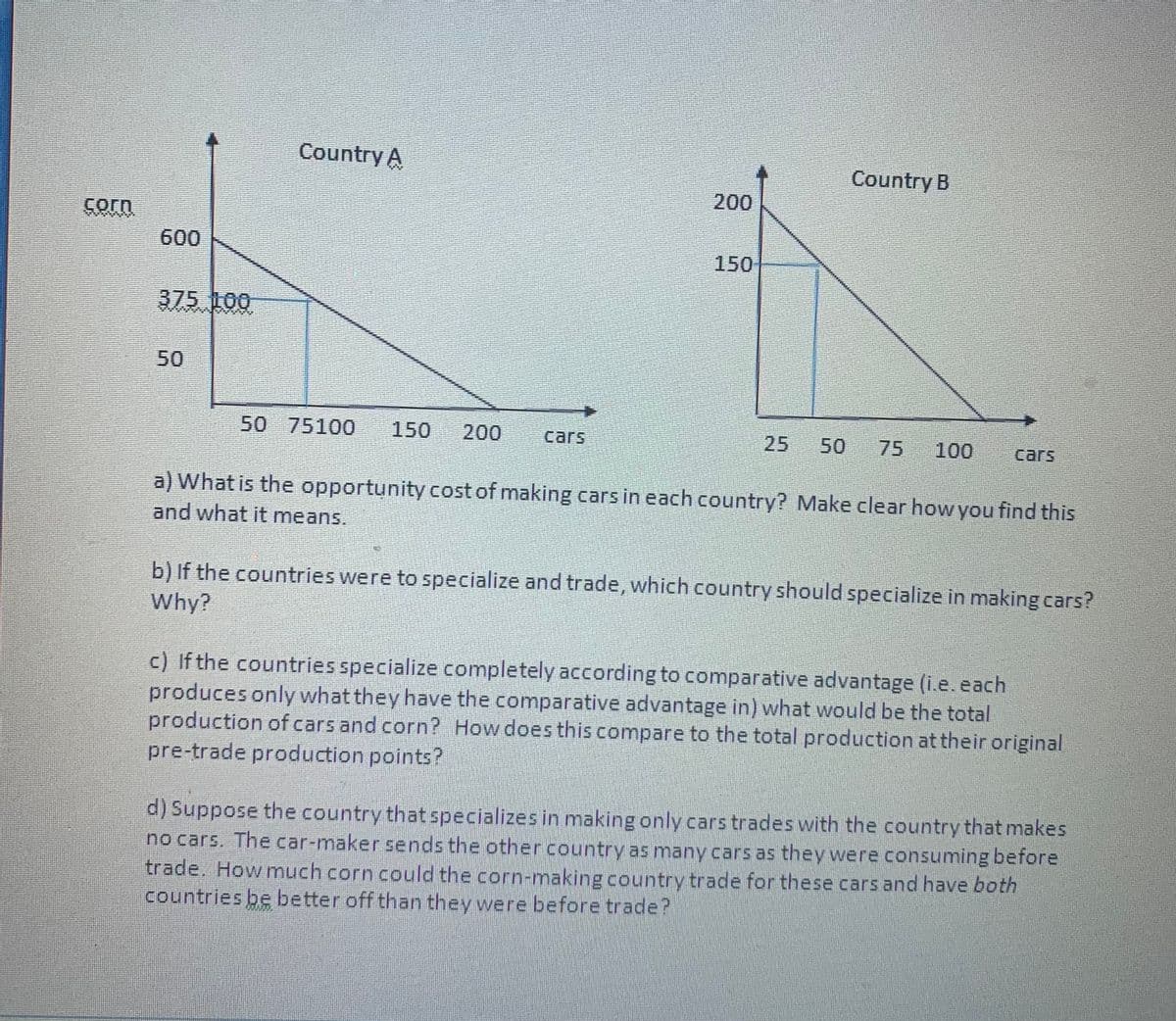Country A Country B 200 Corn 600 150 375 t00 50 50 75100 150 200 25 cars 50 75 100 cars a) What is the opportunity cost of making cars in each country? Make clear how you find this and what it means. b) If the countries were to specialize and trade, which country should specialize in making cars? Why? c) If the countries specialize completely according to comparative advantage (i.e. each produces only what they have the comparative advantage in) what would be the total production of cars and corn? How does this compare to the total production at their original pre-trade production points?
Country A Country B 200 Corn 600 150 375 t00 50 50 75100 150 200 25 cars 50 75 100 cars a) What is the opportunity cost of making cars in each country? Make clear how you find this and what it means. b) If the countries were to specialize and trade, which country should specialize in making cars? Why? c) If the countries specialize completely according to comparative advantage (i.e. each produces only what they have the comparative advantage in) what would be the total production of cars and corn? How does this compare to the total production at their original pre-trade production points?
Principles of Macroeconomics (MindTap Course List)
8th Edition
ISBN:9781305971509
Author:N. Gregory Mankiw
Publisher:N. Gregory Mankiw
Chapter3: Interdependence And The Gains Rrom Trade
Section: Chapter Questions
Problem 9PA
Related questions
Question

Transcribed Image Text:Country A
Country B
200
corn
600
150
375 100
50
50 75100
150
200
cars
25
50
75
100
cars
a) What is the opportunity cost of making cars in each country? Make clear how you find this
and what it means.
b) If the countries were to specialize and trade, which country should specialize in making cars?
Why?
c) If the countries specialize completely according to comparative advantage (i.e.each
produces only what they have the comparative advantage in) what would be the total
production of cars and corn? How does this compare to the total production at their original
pre-trade production points?
d) Suppose the country that specializes in making only cars trades with the country that makes
no cars. The car-maker sends the other country as many cars as they were consuming before
trade. How much corn could the corn-making country trade for these cars and have both
countries be better off than they were before trade?
Expert Solution
This question has been solved!
Explore an expertly crafted, step-by-step solution for a thorough understanding of key concepts.
This is a popular solution!
Trending now
This is a popular solution!
Step by step
Solved in 5 steps

Knowledge Booster
Learn more about
Need a deep-dive on the concept behind this application? Look no further. Learn more about this topic, economics and related others by exploring similar questions and additional content below.Recommended textbooks for you

Principles of Macroeconomics (MindTap Course List)
Economics
ISBN:
9781305971509
Author:
N. Gregory Mankiw
Publisher:
Cengage Learning

Brief Principles of Macroeconomics (MindTap Cours…
Economics
ISBN:
9781337091985
Author:
N. Gregory Mankiw
Publisher:
Cengage Learning

Principles of Microeconomics
Economics
ISBN:
9781305156050
Author:
N. Gregory Mankiw
Publisher:
Cengage Learning

Principles of Macroeconomics (MindTap Course List)
Economics
ISBN:
9781305971509
Author:
N. Gregory Mankiw
Publisher:
Cengage Learning

Brief Principles of Macroeconomics (MindTap Cours…
Economics
ISBN:
9781337091985
Author:
N. Gregory Mankiw
Publisher:
Cengage Learning

Principles of Microeconomics
Economics
ISBN:
9781305156050
Author:
N. Gregory Mankiw
Publisher:
Cengage Learning

Essentials of Economics (MindTap Course List)
Economics
ISBN:
9781337091992
Author:
N. Gregory Mankiw
Publisher:
Cengage Learning

Principles of Economics 2e
Economics
ISBN:
9781947172364
Author:
Steven A. Greenlaw; David Shapiro
Publisher:
OpenStax

Economics: Private and Public Choice (MindTap Cou…
Economics
ISBN:
9781305506725
Author:
James D. Gwartney, Richard L. Stroup, Russell S. Sobel, David A. Macpherson
Publisher:
Cengage Learning